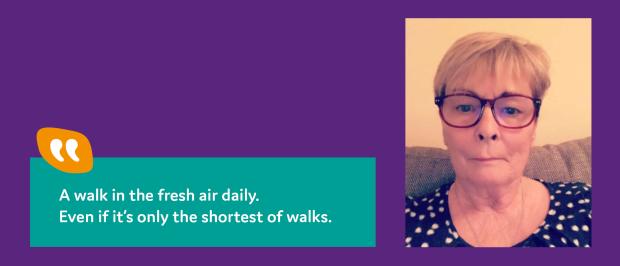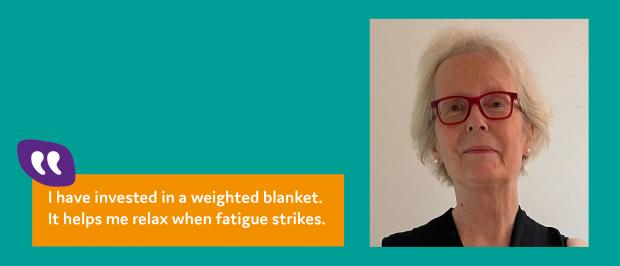Top tips for coping with fatigue
Fatigue - or extreme tiredness or exhauston - can be a symptom of lymphoma or of lymphoma treatment.
We asked members of our Facebook group for their 'top tips' and suggestions for helping to cope with fatigue. Here is what they told us.

Exercise
- I take three short 10-minute walks a day at a similar time each day (regardless of the weather). The fresh air helps stimulate the senses and the smell of freshly cut grass and flowers brightens the mood.
- A daily walk has been really important - even now two years after treatment. If (when!) I overdo things fatigue can knock me sideways but keeping up the walking habit has definitely helped me.
- I try to keep active and twice a week do an exercise session to help with mobility/strength, I'm best in the morning.
- Playing my favourite music that I like to dance to can pick me up.
- My nurse specialist highlighted that the less I did the longer my recovery would be, and the more the fatigue would develop.
- Start with small amounts of exercise and build on it. March on the spot while washing up or take an extra trip upstairs now and again.

Sleeping
- A 20-minute nap can really help. Some people go to bed for an hour but for others that have time restrictions a power nap can be just as effective.
- Finish a nap before 4pm. Anything later than that may affect your nights sleep
- I set a timer when having day naps then when I wake up I do an activity (for me it is having a short walk outside).
- Wear an eye mask at night to block out any light as this improves sleep quality.
- I listen to a good podcast and relax. This makes me feel like I’m being productive rather than lazy!

Eating and drinking
- Making sure I drink plenty of water seems to help me.
- When I cook I make enough for 2-3 days, so my meals just need warming up.
- I prepare several meals to freeze, and I don't feel guilty and have meals at the ready.
- I always try to have a short walk after meal times.
The 3 ‘Ps’ – Plan, Pace & Prioritise
- I get up in the morning when my body lets me.
- I plan my week so I have rest days in between days when I am busy.
- Pace yourself. Don't arrange to do too many things. If I have a busy few days fatigue will hit me and I then need to take a couple of days of looking after myself.
- Do things like cleaning a little at a time. After I started treatment I would do all my cleaning in one go: what a mistake that was! So now I tackle half a room at a time. For example, in the bathroom I clean the shower one day, and the next day I clean the floor and toilet, and the next day I clean the bath and sink.
- Doing your grocery shopping online can save time and energy.
- Just be kind to yourself: recovery is a slow process. If I can't manage much one day then I don't do much. If on another day I can do more, then I do slighlt more, ensuring I rest between jobs. It takes longer to do things but I can achieve more in the long term, and slowly you can build up what you are able to achieve.
- Even now, 18 months in remission, I’m slowly building up more energy with short walks and gentle exercise. But it only takes one day of over-doing it and it sets me back for a good few days.
- I use a fatigue diary. If you mark down times of the day when you have more energy, you may see a pattern emerge and work out when you are likely to have more energy and when you need rest breaks.
- Don’t just plan and prioritise chores: it's important for your wellbeing to plan in some nice things too.
Acceptance
- Accept offers of help. Whether it’s someone offering to prepare a meal, or someone offering to mow the lawn, accepting offers of help not only helps you, but people also like to be helpful and feel that they are supporting you too.
- It can be helpful to accept that life will be different, so it can help to adapt to this.
- Listen to your body, you are not being weak.
- Acknowledging what you are going through, and your thoughts and feeling about your fatigue, can be difficult. It will take time.
- Don’t compare yourself to others: everyone's situation is different so give yourself permission to stop and rest when you need to.
Read our information on fatigue
We have more information about cancer-related fatigue and how to manage it.
This information comes from our Facebook users and online support meeting members, and is a list of suggestions from the community based on what they personally found useful and what they would like to pass on to others. This is not intended to be medical advice and is not a replacement for advice from your medical team. If you are looking for specific guidance for your own personal circumstances always consult your medical team.
